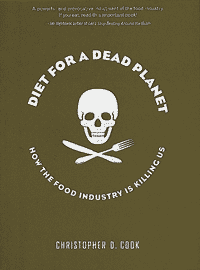
Just looking at its putrescent manure-green dust jacket, it’s clear that Diet for a Dead Planet isn’t light fare. Inside, Christopher Cook lays out a far-reaching takedown of the American food industry, from factory farms to supermarkets to federal regulators. Dead Planet further explores the stomach-churning realm described by Eric Schlosser and others, where a corporate oligarchy increasingly controls our food from farm to grocery shelf, to the detriment of our health and the environment.
Cook takes a disturbing look at the food-borne bacteria that kill thousands of Americans each year and are becoming more resilient thanks to the meat industry’s addiction to antibiotics. He shows us corporate lawyers menacing a rural African American woman in her 90s for complaining about a giant hog farm. (“We will ask the court to put you in prison,” they write in a cease-and-desist letter.) Cook also investigates how supermarket chains shake down food producers for kickbacks called “slotting fees” that can run into the millions of dollars and effectively keep small or independent food producers off the shelves. (Eliot Spitzer, where are you?)
If Cook sees some glimmers of hope in the upsurge of community gardening and the organics movement, he has some grim predictions here, too. As “natural” foods become more lucrative, they risk getting sucked into the machine, becoming just another offering in the “corporate cornucopia.”















